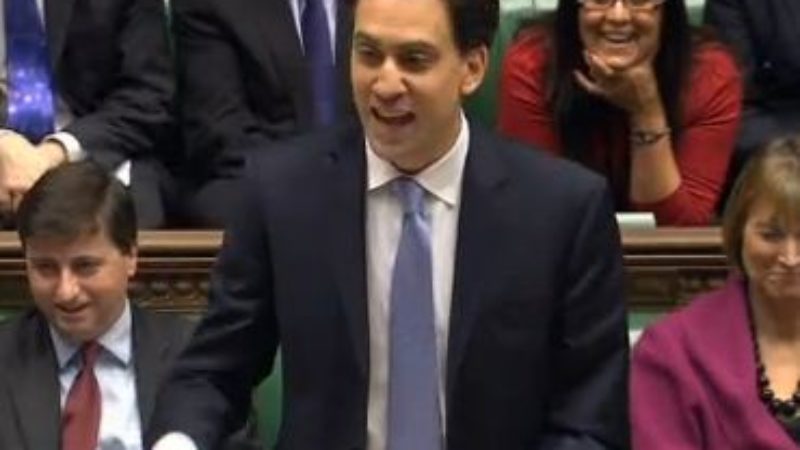
So UKIP are ahead of the Liberal Democrats in the latest YouGov poll. It was only a matter of time. UKIP of course will claim this as their breakthrough moment. Others will say it’s only a blip. UKIP will in all probability fade but something deeper is occurring in British politics and it may give Ed Miliband and Labour a chance of a majority in 2015.
This parliament has turned politically around two key events. The formation of the Coalition gave Labour a third of the Liberal Democrats’ support straight away. They have, by and large, stuck – for now. This instantly made Labour competitive again without it having to lift a finger. The second, it is starting to become clear, is this year’s Budget. We now have enough data to sense that it has been a game changer in the short-term at least.
The question for Labour is will these political turning points be critical come 2015? The fact that the UKIP ‘surge’ is being driven by older voters, 17 percent of whom support UKIP, according to last night’s YouGov poll, suggest this latest phenomenon may be short-lived. The Budget broke the deal for the Coalition. By and large people accept that deficit reduction is necessary but to cut the top rate of tax and mess around with pensioners’ tax allowances created a great deal of anger. Add to that the general whiff of incompetence that hangs around the Coalition and we can understand the cause of the change.
If there had been a major political controversy around some European issue then we may be seeing something else driving this UKIP ‘surge’. ECHR judgements notwithstanding, there hasn’t really been anything on the radar. In fact, according to YouGov, Europe has been declining as an issue consistently since the ‘veto’. It peaked at 38 percent as a ‘one of the most important issues’ facing the country in early December 2011. It is now 11 percent.
These are Budget rather than Brussels refugees. They are disgruntled Conservatives who will, in all probability, return home come 2015. It turns out that there are many older Conservatives who are secretly quite social democratic though they would never dream of voting Labour.
There is a wider impact of the Budget, however, which is critical from Labour’s point of view. The Conservatives have a blue-collar problem. Up until now that has been a personality thing and it may have been enough to deny the Conservatives a majority at the last election. Now it’s becoming a political thing. David Cameron, George Osborne and the ‘squeezed middle’ are from different parts of town.
For ‘blue-collar’ read ‘squeezed middle’ or the ‘identity ambivalents’ who appeared in the Searchlight Fear and Hope Report. They are concerned about the future but still just about optimistic, they are economically struggling, they have concern with free-riders and identity. There are more voters who don’t identify with any political party in this ‘identity ambivalent’ group than in any other. In others words, the Conservatives’ loss is not necessarily Labour’s gain come the General Election. Ed Miliband has to appeal to this group and hold on to the refugee Liberal Democrats to secure a majority. The latter group alone is not enough.
For the first time since the General Election, it is no longer hard to imagine Labour building a majority at the next election. Both the groups that Miliband will have to reach to beyond Labour’s 2010 vote need more from the party. Former Liberal Democrats need to know that the party is not stuck in the past, playing an outdated class politics. The ‘identity ambivalents’ need to know that the party is not going to wreck the economy and allow free-riders to take advantage of them while they are doing the right thing.
Labour’s major issue is still that it is not trusted on the economy. Until it addresses this with both the Liberal Democrat refugees and ‘identity ambivalents’ in mind then the strategy is going to fall short. It’s not deficit or jobs – it’s both. It not head or heart – it’s both. Shifting the economic stance is a critical first strategic step.
Actually, Labour’s broad strategy to talk about responsibility at the top and the bottom and to seek a political conversation with the ‘squeezed middle’ is not a bad starting place once the economic competence issue has been properly confronted. It needs to be brought to life with symbolic policies and communicated in a different way but the basic thinking is right. It’s not all about petrol, pasties and prices. It’s also about getting on, having hope for your kids and ensuring those who do the right thing are rewarded. It’s also about deficit reduction done more equitably.
All that can be done at this stage of the Parliament is to secure the foundations. The party system is in flux. Support for all the parties is pretty flaky and volatile. It’s an old politicians’ excuse that you shouldn’t pay too much attention to opinion polls. But in terms of the headline figures you shouldn’t really at this stage. Look at the underlying data and the shifts instead. What it shows more than anything else is that building a majority is going to be tricky for both main parties – even with a Liberal Democrat collapse.
If the foundations are secured then Ed Miliband becoming Prime Minister is a real prospect. Whatever happens in two weeks’ time, the next few months will be decisive. Will the Conservatives’ strategic blunder open the pathway to power for Miliband? It’s in his gift – for the first time. That’s a much better position in which to find yourself; now to take advantage.




More from LabourList
‘Turning public services around: Haringey’s story of child protection’
‘Can Labour turn the green tide back to red?’
Tom Belger column: ‘Why is Labour making migrant exploitation easier?’